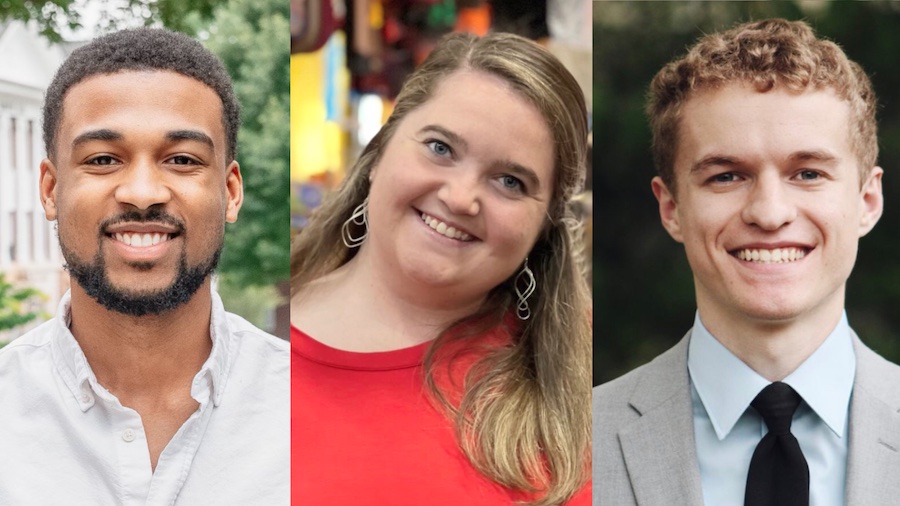Let’s face it—life in general depends on strong and secure digital networks. The more areas of life are dependent upon this, the more there are areas of vulnerability, thus the greater need for robust defenses and the greater the demand for qualified cybersecurity professionals.
The Anderson University Center for Cybersecurity is preparing future professionals to meet an ever increasing need to safeguard an ever growing digital infrastructure.
Students are learning about cybersecurity ethics, network management, security and compliance, cloud security, cryptography, digital forensics, ethical hacking and cyberthreat intelligence. They learn about cyberthreats and how to combat them in a cybersecurity range, a lab setting isolated from outside networks. Students also get to use their experience working summer internships in business, healthcare and other sectors. Anderson University cybersecurity students have also won top national honors in capture the Flag (CTF) competitions that demonstrate their skills on a larger stage.
Abigail Catoe, a Cybersecurity and Criminal Justice major, is also in the Cybersecurity Honor Society, the Order of Sword and Shield. Catoe is in her second of two summer internships, working with telemedicine at a large hospital system. Her first internship was at a bank helping employees recognize phishing and other cyberthreats so that sensitive information can be protected. Now, she helps to ensure that technology used in healthcare is protected so that doctors and other medical staff can focus on the health of their patients.
Catoe feels confident about how the Center for Cybersecurity has prepared her for summer internships, thanks to hands-on training where she’s been able to learn more than would be possible if she was just listening to a lecture.
Looking past graduation, Catoe said, “I’m really kind of thinking along the lines of (working at a) government agency. I’m still exploring the potential of it and I think that having that Criminal Justice background kind of helps with that. After doing these internships, I’m pretty much open to just about anywhere because I love cyber.”
Markel Samuel is a cybersecurity major from Columbia. While in high school helping other students solve problems with their laptops, he was keenly interested in computers but wanted to take things further. Also, it was important for him to attend a Christian university.
“I knew that IT was a very general topic. I wanted to be more in depth and so I chose cybersecurity because I understood the trajectory of where we’re going in the future. There will always be vulnerabilities in the computer systems that we use, partially because our society is increasingly dependent on computers. The more systems we use, the more services being offered, which results in more vulnerabilities attackers can exploit,” Samuel said. “So having that mindset when I researched it more, I made the decision to major in Cybersecurity.”
Samuel is currently a cybersecurity and compliance intern with an accounting firm in Greenville. With his graduation coming up in December, Samuel is considering job opportunities as a cybersecurity compliance consultant.
“AU’s program is extremely hands-on. From the first semester, you have hands on the keyboard. You’re doing real world stuff. A lot of the stuff that we did in the classroom, I’m actually doing at my internship, and people and other alumni I talked to, they’re actually using it in their day-to-day jobs,” said Matthew Saul, a rising senior who is interning at a technology solutions company in Greenville.
“I’ve been exposed to a lot of different real world scenarios and being able to apply what I’ve learned in the classroom, because it’s one thing to learn it in a sandbox environment, a test environment, and actually see it in real life. To see it in real life with the unknowns, it’s a whole different experience, but it’s been a great learning opportunity,” Saul said. “Right now I’m working in the private space but I would definitely like to move into that because I tend to lean in more towards the digital forensics side of things and so I feel like a lot of the opportunity in that area is in the federal sector.”
After graduating and possibly pursuing graduate studies, Saul hopes to pursue work in government, perhaps at a federal sector.
The Anderson University Center for Cybersecurity trains students to meet the unique demands of today’s cybersecurity industry. The Center gives you the freedom to choose a degree track that focuses solely on cybersecurity or adds specializations in one of three areas: analytics, criminal justice, or mathematics. Details can be found online.

